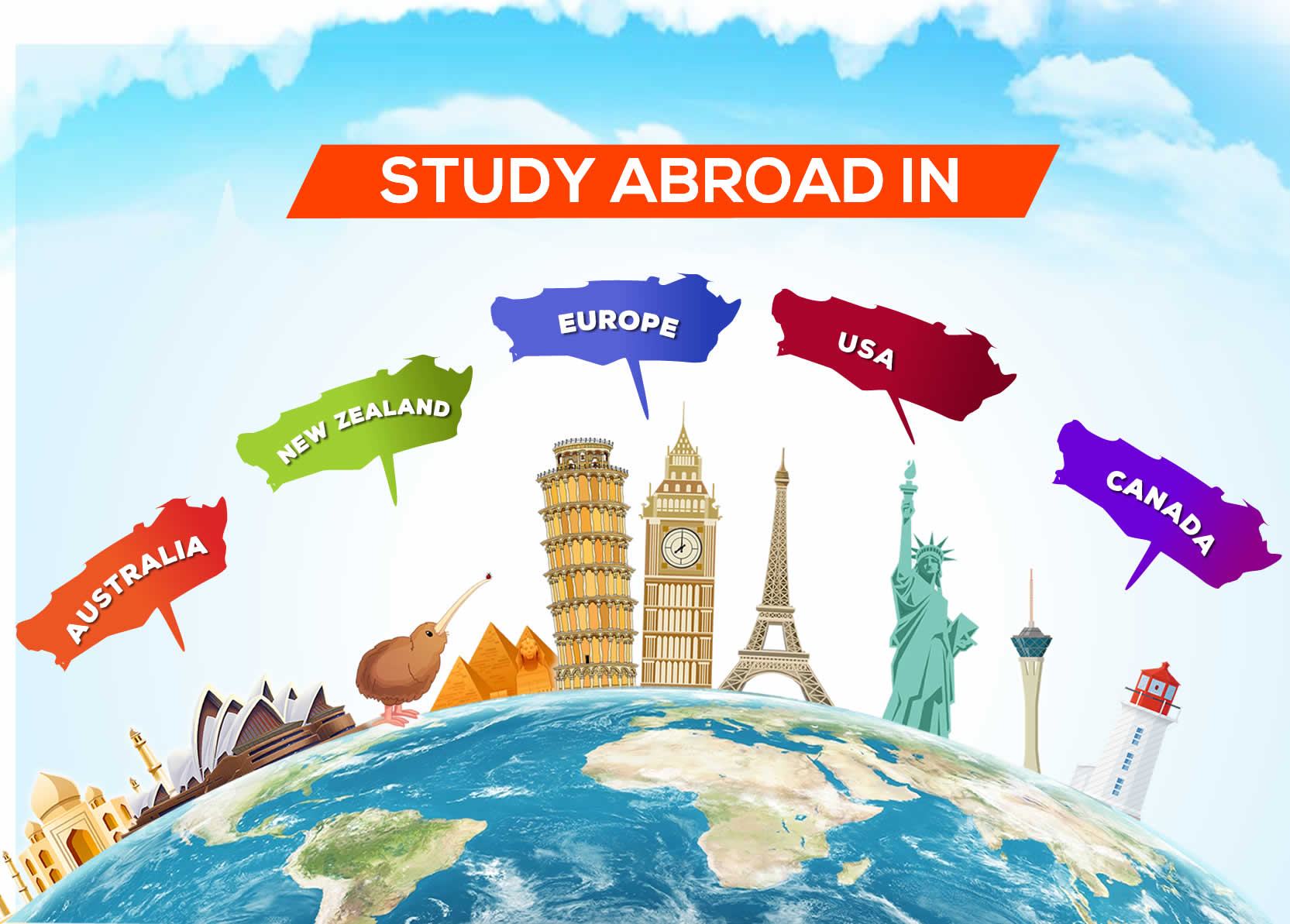Studying Abroad!
Studying Abroad
Benefits, Challenges & Considerations
Studying abroad means getting an education in a foreign country, away from home. It includes adapting to a new academic and cultural environment, which can be difficult but also beneficial.
Why Study Abroad?
Studying in another country can be a life-changing experience, providing a special chance for learning and personal development outside your home country. Leaving home and exploring a new educational setting can lead to unique academic and personal growth.
Benefits
1. Academic opportunities: One of the primary benefits of studying abroad is exposure to advanced academic opportunities that may not be readily available in one's home country.
For instance, in Nigeria, where academic opportunities can be limited and outdated, studying abroad provides access to cutting-edge research, modern facilities, and exposure to diverse academic disciplines and teaching methodologies that would pique your interest in school work, enrich your academic experiences and expand your intellectual horizons.
Additionally, studying abroad encourages interdisciplinary learning by integrating classroom knowledge with real-world experiences.
You practice what you learn
Field trips, internships, and research projects are also opportunities you could seize to set your career off. This exposure enhances the quality of education and prepares you for global competitiveness.
2. Improved learning environment: Studying abroad fosters a more conducive learning environment conducive to personal and academic growth. You would benefit from smaller class sizes, personalized attention from professors, and a curriculum that emphasizes critical thinking and practical application.
3. Cultural awareness and adaptability: By immersing oneself in a different culture, you can develop cross-cultural communication skills, empathy, and a broader worldview.
You would be able to see the world beyond your country.
This experience enhances your ability to navigate diverse environments and collaborate effectively on a global scale.
4. Networking Opportunities: Studying abroad provides valuable networking opportunities with other international students, professors, and professionals. Building a global network can improve career prospects and create lifelong connections in terms of career.
5. Stable academic system and setting: In certain underdeveloped countries, like Nigeria, the inconsistencies in these countries' governments often affect the education sector, consequently affecting the education of students. However, in privileged countries, like the UK, you have that stability and peace of mind. Unfortunate activities like strikes rarely happen, thereby preventing disruption in your academics.
6. Networking Opportunities: Studying abroad provides valuable networking opportunities with other international students, professors, and professionals. Building a global network can improve career prospects and create lifelong connections in terms of career.
7. Personal Development: Living alone for the first time can be exciting, especially if you have never lived so far away from your family. Living independently in a foreign country encourages personal growth, self-reliance, and adaptability. You would learn to handle unfamiliar situations and gain valuable life skills, such as budgeting, time management, and problem-solving becoming a more confident and resilient individual.
Living alone also encourages self-discovery and the development of one's identity. It provides the opportunity to create a space that truly reflects your values. Additionally, being in a new environment often leads to forming new friendships and connections, broadening one's social circle and cultural awareness.
8. Career Advancement: Studying abroad can improve career opportunities by exposing you to global industries and developing cross-cultural skills that employers value. Having international experience can give you an advantage in the competitive job market. Graduating from a university in Germany or Singapore provides an advantage in terms of experience, skills, and knowledge gained compared to graduating from a Nigerian university.
Challenges & Considerations
1. Finances: Despite the many advantages, studying abroad has various factors and difficulties to consider, one of which is the common belief that it is only possible for wealthy individuals. While cost is a significant consideration, scholarships, financial aid, and budgeting strategies can make studying abroad more attainable.
2. Language barrier and cultural adjustment: For countries like Germany, Sweden, or China, language and cultural barriers can present initial challenges, requiring patience and open-mindedness. However, these obstacles can be overcome with the help of language courses, cultural immersion programs, and local peer support networks.
3. Career Mobility: Certain degrees obtained from foreign countries may only be recognized within that specific country, limiting career opportunities outside the country where the degree was earned. It is important to thoroughly research the recognition of degrees from the college and country where you plan to study, to ensure their qualifications are accepted and valued internationally.
4. Residency and Work Permits: Another important factor to consider is the availability of residency opportunities for international students. Some countries have easy processes for international students to obtain residency and work permits, while others have complex processes or refuse entirely. You must understand the visa requirements, work permits, and post-graduation options for the country you wish to study in for a successful study abroad experience.
5. Social Integration: Building connections with people from different nationalities and settling in a new environment can be challenging. This could cause you to feel lonely or homesick, especially in the beginning. However, being confident in making new friends, joining clubs, attending cultural events, and participating in community activities can help with social integration. This can also broaden your cultural awareness and allow you to experience new things you may have never considered. Additionally, staying in touch with loved ones back home through social media and video calls can help with homesickness.
6. Academic Transitions: Although studying in a new country is exciting, adjusting to a new system and curriculum can be overwhelming, especially if the standards and expectations differ from what you're used to. For example, the curriculum and learning system in Canada or the US may be more intense and rigorous than Nigeria’s. Meeting deadlines for numerous assignments from different courses can be mentally stressful. However, by getting academic advice and tutoring services at the school you will be attending, learning the art of self-discipline and managing your time effectively can help you successfully navigate these academic changes.
7. Financial Management: In a new environment with independence, without your parents to boss you around, you might be tempted to splurge or waste the little finances sent to you from them. Managing finances in a foreign currency and budgeting effectively requires careful planning and financial literacy. Utilize resources like student discounts and budgeting tools to manage expenses. Also, embrace the art of contentment with the little you have at each stage of life. Don't overspend to impress. That's not necessary over there.
Studying abroad provides unique academic, cultural, and personal advantages. Despite the challenges and factors to consider, the experience of studying abroad has a significant impact beyond just academics, helping you develop a global perspective and skills to succeed in a connected world.
Terminologies:
1. Studying Abroad: Pursuing education in a foreign country away from one's home country.
2. International Students: Students who travel to a foreign country to pursue education from a different country than their own.
3. Visa: Official permission granted by a country to enter and stay for a specified period, typically for study or work purposes.
4. Student Discount: Reduced prices or special offers available to students for various goods and services, often requiring student identification.
5. Residency: The status of being a resident in a particular place, often referring to legal residence status in a foreign country for study or work.
6. Work Permits: Official authorization allowing foreign nationals to work legally in a specific country.
7. Field Trips: Educational trips or excursions organized for students to visit places of interest related to their studies.
8. Job Markets: The environment where employers seek employees and job seekers search for employment opportunities.
9. Career Prospects: Potential job opportunities and advancement prospects available to individuals based on their education, skills, and experience.
10. Internships: Temporary work experiences offered by companies to students or recent graduates to gain practical skills and workplace experience.
11. Academic Discipline: Specific fields of study or areas of expertise within education, such as biology, history, or engineering.
12. Teaching Methodologies: Various approaches and techniques used by educators to deliver instruction and facilitate learning in the classroom






Comments
Post a Comment
Share your opinions!